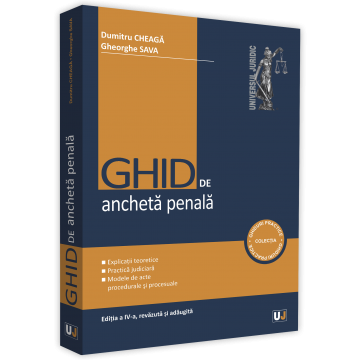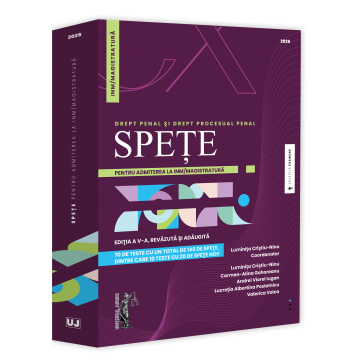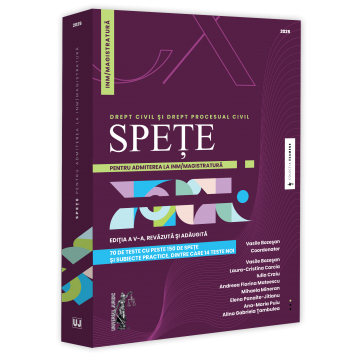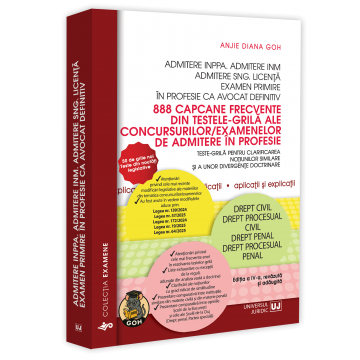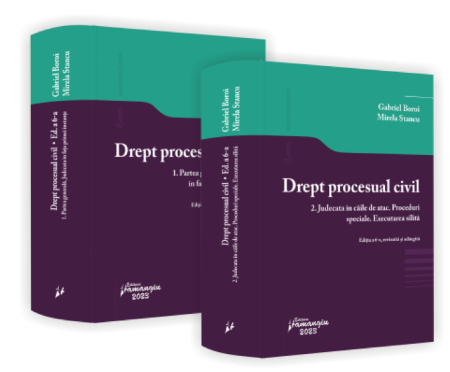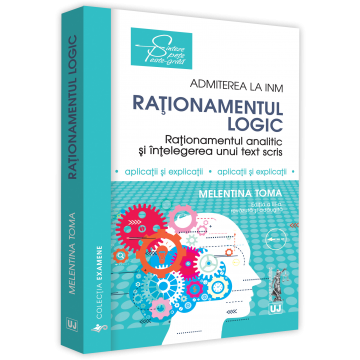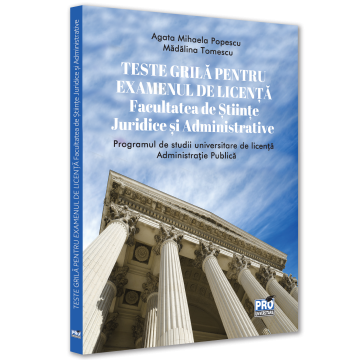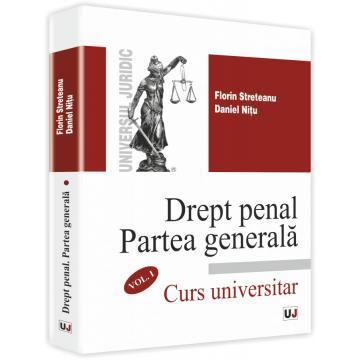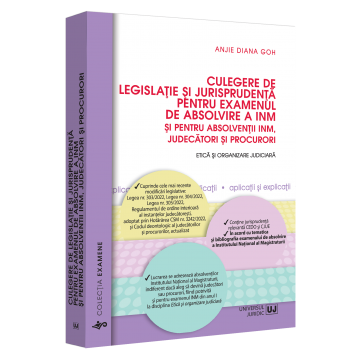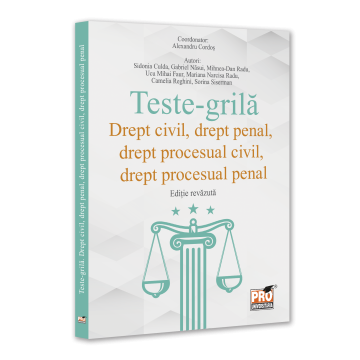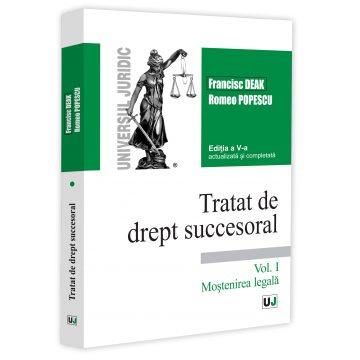6359.png) Corporate covenants - clauses, covenants, agreements between associations of companies - Daniel-Mihail Sandru
Corporate covenants - clauses, covenants, agreements between associations of companies - Daniel-Mihail Sandru
6359.png)
ISBN: 978-973-749-960-8
Publisher year: 2010
Edition: I
Pages: 240
Publisher: Editura Universitară
Author: Daniel-Mihail Sandru
- Description
- Authors
- Content
- More details
- Reviews (0)
The "word before" of the volume, which we reproduce below, is signed by the renowned specialist Gheorghe Buta.
The pacts (conventions) between the partners represent a manifestation of the contractual freedom in the matter of the commercial companies. The commercial companies constituted by the need to ensure the convergence of the energies and individual resources of the associates - insufficient for the achievement of a real economic progress - have not replaced, not even by the general meetings that function within them, as a way of expression, the role of the associates.
In order to protect both the social interest and their particular, individual interests, the associates within the commercial companies usually conclude conventions regarding certain societal rights on which they can dispose.
The agreements between the associates are therefore of a contractual nature, with all the consequences deriving from such a qualification, just as a general way of setting up commercial companies.
The foundation of any company with several associates is a collective legal act, respectively a contract, by which several persons decide to associate in order to carry out a commercial activity and agree, through a statute adapted to their needs and proposed objectives, on how in which they understand to organize both the relations between them, as members of the respective entity, and the functioning of the commercial company. This considering that participation in society involves compliance with a collective discipline, which is found in several well-known legal concepts: affectatio societatis, the principle of preeminence of social interest, the principle of equal legal status between partners and the principle of majority. And the associates, through agreements, clauses and agreements, tend to create, during the development of the company contract, a network of contracts through which they enrich or restrict the legal rights and obligations related to the quality of associate.
Under these conditions, the contract - as a bivalent expression of both freedom and coercion - could give rise to tensions and even a conflict between the common interest of the partners and the personal interests of them or of some of them. And when this conflict cannot be extinguished or settled by the associates, the justice is called that, based on the legal dispositions, but also on the basis of the statutory and contractual provisions, to settle it.
Associates who are part of a company whose very existence may be the subject of controversy or even controversy, inside or outside it, must understand as accurately as possible the objectives they can achieve within this entity, as well as the rights they have. may act as members thereof.
We consider that, to this necessary understanding, the present monograph, in its second edition, can make an important and useful contribution. Law no. 31/1990 on commercial companies represents the general legal framework regarding the establishment, organization, functioning and disappearance of commercial companies in Romania, a series of laws and other normative acts with special character regulating different “special” types of commercial companies, all these provisions being completed. , where applicable, with the provisions of the Commercial Code or those of the Civil Code. But, from the vast subject of the regulations on commercial companies - which could be designated by the phrase, insufficiently comprehensive, perhaps, "company law" - the author of this monograph and proposed to examine and expose only the aspects related to the relations between partners ( including from the future associates) “from the moment of negotiating the incorporation of the commercial company or of the inclusion of new associates, by modifying the constitutive act, during the existence of the company”.
The author, through the way of exposing and analyzing the approached approach, follows and manages to demonstrate that the successive changes made in the matter, "have increasingly provided a beneficial framework for agreements / understandings between partners", the possibility of partners to negotiates, in the different stages of the establishment and functioning of the company, being an application of the principle of contractual freedom, within the limits imposed by the legislator. Analyzes on issues related to the regime of agreements between partners, clauses, pacts, general agreements and those between partners in different types of companies establishing the company's headquarters and freedom of establishment in the European Union and resolving disputes between partners through arbitration are thorough, and solutions and the author's assessments on these issues are correct and well-founded, with arguments resulting from both legal regulation and doctrinal research and jurisprudence. In conclusion, through precise systematic analyzes and documents on the proposed topic, through the solutions given as well as through the bibliographic and jurisprudential information it offers, this monograph is an information and useful tool primarily for associates in companies and future partners in such companies, but also for those who, in the activity of scientific research or in the practical one, are preoccupied with the legal problems of the commercial companies.
Dr. Gheorghe BUTA Associate Lawyer - Musat & Asociatii
University professor at the University of Bucharest, "Dimitrie Cantemir" Christian University. He founded and coordinates the Center for European Law Studies of the Institute for Legal Research „Acad. Andrei Radulescu ”of the Romanian Academy. Ad hoc judge at the European Court of Human Rights and arbitrator at the International Commercial Arbitration Court attached to the Romanian Chamber of Commerce and Industry. President of the Society of Legal Sciences and of the Romanian Association of European Law and Affairs. Editor-in-Chief of the Romanian Journal of European Law (Wolters Kluwer).
Dr. Gheorghe Buta, Foreword / 5
INTRODUCTION / 15
Section 1. The legal framework in Romania / 15
Section 2. Persons who can conclude pacts / 17
Section 3. The notion and classification of pacts / 18
Section 4. The need for pacts / 22
Section 5. Drafting company agreements / 22
CHAPTER I. PRINCIPLE OF CONTRACTUAL FREEDOM - FUNDAMENTALS OF AGREEMENTS BETWEEN ASSOCIATES
Section 1. The principle of contractual freedom / 25
Section 2. The common interest of the associates and the social interest / 25
Section 3. Definition of the company and delimitation of other legal institutions / 28
CHAPTER II. REGIME OF AGREEMENTS BETWEEN ASSOCIATES / 40
Section 1. Validity of agreements between partners / 40
Section 2. Opposability of agreements between partners / 41
Section 3. Forced execution of pacts between associates / 42
Section 4. Interpretation of pacts / 44
Section 5. Publicity of the constitutive acts / 46
CHAPTER III. CLAUSES, AGREEMENTS, GENERAL AGREEMENTS / 50
Section 1. Covenants (agreements) applicable to all forms of company / 50
Clauses regarding the expenses occasioned by the establishment of the company / 50
Clauses on participation in profits and losses / 51
The importance of establishing clauses regarding benefits and losses / 51
Prohibition of leonine clauses / 52
Amount of dividends / 52
The legal regime of the leonine clauses / 54
Contribution clauses / 55
Clauses relating to affectio societatis / 58
Company and emblem clauses / 59
Firm / 59
Company definition / 59
Company name in collective name / 59
The company of a limited partnership / 60
The company of a limited liability company / 60
The company of a joint stock company or limited partnership / 62
Company emblem / 63
Prohibitions and legal restrictions in approaching certain terms in the content of companies / 63
General conditions / 63
Special procedures for granting the name / 67
The procedure for issuing the agreement for the use of the name. / 68
Clauses relating to the assignment of goodwill / 70
Section 2. Choosing the form of the company / 71
Section 3. Effects of violating the legal requirements for incorporation / 74
Section 4. Nullity of the company / 77
Section 5. Branch clauses / 82
Section 6. Choice of object of activity and agreements between associates regarding the object of activity / 91
Section 7. Modification of the constitutive act - general features / 95
Section 8. Temporary suspension of activity / 100
Section 9. Headquarters Pacts / 103
Section 10. Agreements regarding the duration of the company / 104
CHAPTER IV. ESTABLISHMENT OF THE COMPANY'S HEADQUARTERS AND FREEDOM OF ESTABLISHMENT IN THE EUROPEAN UNION / 109
Section 1. The importance of choosing the main headquarters of the Romanian companies / 109
Section 2. Systems for the establishment of companies in the European Union / 121
Section 3. Case study on freedom of establishment: Centros case, C ‑ 212/97/127
Section 4. Cartesio C ‑ 210/06 - new valences, problem (still unresolved) / 135
CHAPTER V. AGREEMENTS BETWEEN ASSOCIATES OF PERSONS (SNC AND SCS) / 137
Section 1. Covenants on the right to use the company's funds / 137
Section 2. Covenants on the right of supervision and control / 137
Section 3. Non-compete agreements / 138
Section 4. Covenants regarding the meetings of the associates / 139
CHAPTER VI. LIMITED LIABILITY COMPANY / 140
Section 1. Covenants relating to general meetings / 140
The rights and obligations of the associates / 141
Obligations of the associates / 141
Section 2. Clauses relating to administrators / 142
Preliminary details / 142
Administration within the company / 143
Management of the company in relation to third parties / 144
The right to represent society / 145
The cumulation of the quality of administrator and the conflict of interests / 146
Administrator at several companies / 146
The cumulation of the quality of administrator with that of associate in a competing company / 148
Conflict of interest / 148
Clauses relating to the liability of the administrator / 149
Civil liability / 149
Preliminary details / 149
Administrator liability cases. / 150
The right to action against the administrator / 151
Disclaimers / 152
Criminal liability / 153
Section 3. Covenants on the assignment of shares / 153
The principle of transmission of the social parts / 153
Assignment of shares / 154
The effects of the transfer of shares / 155
The sanction of not registering the assignment operation at the Trade Register / 156
Section 4. Are conventions on the exclusion of associates possible? / 156
CHAPTER VII. AGREEMENTS CONCLUDED BETWEEN SHAREHOLDERS (SA AND SCA) / 163
Section 1. Covenants on the right to vote / 163
Exercise of the right to vote / 163
Legal restrictions on the right to vote / 164
Suspension of the right to vote / 165
Uthe fruit of the shares / 165
Real movable guarantees / 165
Statutory clauses regarding the access to the general meeting of shareholders / 167
Secret voting clauses / 167
Section 2. Agreements regarding the representation of shareholders in the general meeting / 168
Persons who can be agents / 168
Obligation of the special power of attorney / 168
Legal restrictions on representation / 170
Clauses of the constitutive act regarding the representation of the associates / 171
Section 3. Capital Pacts / 172
Pacts regarding the release of the social contribution / 172
.Pacts on shares / 173
Legal regime of shares / 173
Types of actions / 173
Content of actions / 174
Transfer of ownership of shares / 175
Usufruct Convention on Shares / 178
Acquisition of own shares by the company / 179
Agreements on the reduction of share capital / 182
General considerations / 182
Ways to reduce the share capital / 183
Pacts regarding the increase of the share capital / 186
Forms of capital increase / 186
The right of pre-emption / 189
Issue premium / 190
Section 4. Covenants relating to general meetings / 193
Shareholder quality / 193
Pacts regarding the meeting of the general and the special assembly / 193
Clauses regarding the validity of the deliberations / 194
Clauses regarding the validity of the deliberations of the ordinary assembly / 194
Validity of the deliberations of the extraordinary general assembly / 195
Clauses regarding the convening of general meetings / 195
Statutory clauses regarding the initiative of convening the general assembly / 195
Spontaneous general assembly / 196
Statutory clauses regarding the content of the convocation of the general assembly / 197
Section 5. Representation of the joint stock company vis-à-vis third parties / 198
Section 6. Are conventions on the exclusion of associates possible? / 199
6.1. Conventions regarding the exclusion of shareholders are not possible for joint stock companies / 199
6.2. The rights and obligations of the excluded associate / 200
Section 7. Withdrawal of the shareholder from joint stock companies / 201
Section 8. Agreements between shareholders in mergers / 213
CHAPTER VIII. SETTLEMENT OF DISPUTES BETWEEN ASSOCIATES THROUGH ARBITRATION / 215
Section 1. Importance and place of arbitration in resolving disputes between associates / 215
Section 2. Autonomous utilities, state-owned companies and groups of companies / 217
Section 3. The commercial companies established by virtue of Law no. 31/1990 / 218
Section 4. Empowerment to sign an arbitration agreement / 223
Conclusions / / 225
Bibliography / 228
The "word before" of the volume, which we reproduce below, is signed by the renowned specialist Gheorghe Buta.
The pacts (conventions) between the partners represent a manifestation of the contractual freedom in the matter of the commercial companies. The commercial companies constituted by the need to ensure the convergence of the energies and individual resources of the associates - insufficient for the achievement of a real economic progress - have not replaced, not even by the general meetings that function within them, as a way of expression, the role of the associates.
In order to protect both the social interest and their particular, individual interests, the associates within the commercial companies usually conclude conventions regarding certain societal rights on which they can dispose.
The agreements between the associates are therefore of a contractual nature, with all the consequences deriving from such a qualification, just as a general way of setting up commercial companies.
The foundation of any company with several associates is a collective legal act, respectively a contract, by which several persons decide to associate in order to carry out a commercial activity and agree, through a statute adapted to their needs and proposed objectives, on how in which they understand to organize both the relations between them, as members of the respective entity, and the functioning of the commercial company. This considering that participation in society involves compliance with a collective discipline, which is found in several well-known legal concepts: affectatio societatis, the principle of preeminence of social interest, the principle of equal legal status between partners and the principle of majority. And the associates, through agreements, clauses and agreements, tend to create, during the development of the company contract, a network of contracts through which they enrich or restrict the legal rights and obligations related to the quality of associate.
Under these conditions, the contract - as a bivalent expression of both freedom and coercion - could give rise to tensions and even a conflict between the common interest of the partners and the personal interests of them or of some of them. And when this conflict cannot be extinguished or settled by the associates, the justice is called that, based on the legal dispositions, but also on the basis of the statutory and contractual provisions, to settle it.
Associates who are part of a company whose very existence may be the subject of controversy or even controversy, inside or outside it, must understand as accurately as possible the objectives they can achieve within this entity, as well as the rights they have. may act as members thereof.
We consider that, to this necessary understanding, the present monograph, in its second edition, can make an important and useful contribution. Law no. 31/1990 on commercial companies represents the general legal framework regarding the establishment, organization, functioning and disappearance of commercial companies in Romania, a series of laws and other normative acts with special character regulating different “special” types of commercial companies, all these provisions being completed. , where applicable, with the provisions of the Commercial Code or those of the Civil Code. But, from the vast subject of the regulations on commercial companies - which could be designated by the phrase, insufficiently comprehensive, perhaps, "company law" - the author of this monograph and proposed to examine and expose only the aspects related to the relations between partners ( including from the future associates) “from the moment of negotiating the incorporation of the commercial company or of the inclusion of new associates, by modifying the constitutive act, during the existence of the company”.
The author, through the way of exposing and analyzing the approached approach, follows and manages to demonstrate that the successive changes made in the matter, "have increasingly provided a beneficial framework for agreements / understandings between partners", the possibility of partners to negotiates, in the different stages of the establishment and functioning of the company, being an application of the principle of contractual freedom, within the limits imposed by the legislator. Analyzes on issues related to the regime of agreements between partners, clauses, pacts, general agreements and those between partners in different types of companies establishing the company's headquarters and freedom of establishment in the European Union and resolving disputes between partners through arbitration are thorough, and solutions and the author's assessments on these issues are correct and well-founded, with arguments resulting from both legal regulation and doctrinal research and jurisprudence. In conclusion, through precise systematic analyzes and documents on the proposed topic, through the solutions given as well as through the bibliographic and jurisprudential information it offers, this monograph is an information and useful tool primarily for associates in companies and future partners in such companies, but also for those who, in the activity of scientific research or in the practical one, are preoccupied with the legal problems of the commercial companies.
Dr. Gheorghe BUTA Associate Lawyer - Musat & Asociatii

![Corporate covenants - clauses, covenants, agreements between associations of companies - Daniel-Mihail Sandru [1] Corporate covenants - clauses, covenants, agreements between associations of companies - Daniel-Mihail Sandru [1]](https://gomagcdn.ro/domains/editurauniversitara.ro/files/product/large/pacte-societare-clauze-pacte-nelegeri-ntre-asociaii-societilor-comerciale-2214-371921.jpg)
